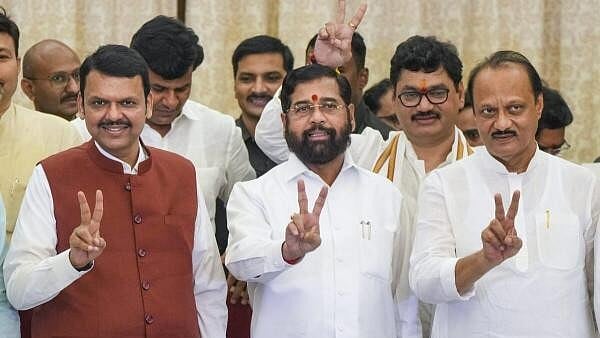
Eknath Shinde with Devendra Fadnavis, Ajit Pawar.
Credit: PTI File Photo
Like it or not, the ruling Bharatiya Janata Party (BJP) is having the last laugh in Maharashtra, with its allies — the Eknath Shinde-led Shiv Sena and the Ajit Pawar-led Nationalist Congress Party — increasingly becoming objects of ridicule and subjects of controversy.
Deputy chief ministers Shinde and Pawar, and their parties, are gradually losing their political heft as well as sheen with one row after another. And, the ultimate beneficiary is the BJP.
The omissions and commissions of some of their leaders and ministers in Shinde’s sena and Pawar’s NCP are the talk of the town, and are lapped up by the Opposition to target Chief Minister Devendra Fadnavis and his government. Opposition scrutiny has helped Fadnavis put pressure on the allies in the ruling coalition.
In a general caution to all council of ministers, recently the chief minister said that these ministers should avoid creating controversies, warning that he would be forced to take action against them. Reports quoting unnamed sources said that at a 30-minute meeting with the council of ministers, Fadnavis advised the ministers to avoid speaking to the media, and instead focus on development work.
The Fadnavis government, in the eight months that it has been in power, has had more than its share of controversies. Dhananjay Munde, a close aide of Pawar, lost his Cabinet ministership following the controversy surrounding the murder of a sarpanch in Beed district in the Marathwada region by the NCP leader’s henchman. Another NCP minister, Manikrao Kokate, has come under attack for allegedly playing rummy on his mobile phone while the Assembly was in session.
A host of ministers from Shinde’s sena are in the spotlight for all the wrong reasons: Last month, Social Justice Minister Sanjay Shirsat received an income tax notice over an increase in assets. Recently, the state government ordered an inquiry into a hotel deal which involves a company associated with Shirsat’s son. The Minister of State for Home, Yogesh Kadam, landed in controversy after the Opposition brought to light that he had a dance bar listed in his mother’s name. The Opposition is demanding the resignations of these ministers.
The growing embarrassment of the allies makes the BJP powerful, especially ahead of a possible seat-sharing deal among allies for the upcoming civic polls. With the Shinde sena and NCP (Ajit Pawar) on the back foot, the BJP will have an upper hand.
The civic polls, dubbed as the mini-Assembly polls, are expected by the end of the year, and the party that can benefit from the growing woes of its allies is the BJP. In fact, the BJP is now firmly entrenched in power and hardly needs the support of the Shinde sena and Ajit Pawar’s NCP.
Weakened regional allies give the BJP an opportunity to play on the front foot. Control of India’s richest civic body, which for a long time has been with the Shiv Sena, is now within reachable distance for the national party.
At a personal level, Shinde has cause for concern after the appointment of Ravindra Chavan as the president of the Maharashtra BJP. Chavan is an influential grassroots leader from Thane, the home turf of Shinde.
It’s not, however, smooth sailing for Fadnavis and the BJP. The party’s relentless push for Hindi has unwittingly brought the estranged Thackeray cousins — Uddhav Thackeray of the Shiv Sena (UBT) and Raj Thackeray of the Maharashtra Navnirman Sena (MNS) together. The development is bound to have an impact on the civic polls, especially in Mumbai, Thane, and Nashik. Their political existence in crisis, the cousins seem to realise that they need each other to move ahead.
The reunion is expected to change the equations within the Maha Vikas Aghadi comprising the Congress, Sharad Pawar’s NCP, and the Shiv Sena (UBT).
The BJP might deny it, but with every passing day, the impression gaining ground is that the BJP is confident of its place in Maharashtra’s politics, and does not mind playing big brother with its allies.
Sunil Gatade and Venkatesh Kesari are senior journalists.
Disclaimer: The views expressed above are the author's own. They do not necessarily reflect the views of DH.